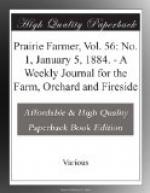The remedy for most of these evils can only come from intelligent and wise action on the part of the creamery patrons of a given locality. They should study to prevent an unseemly and expensive competition. They, as the encouraging source, will surely in the end pay the expense of it. It has been said that no people in the world enjoy paying taxes like Americans, provided they are only indirect, sugar coated, and with some plausible pretense. It would seem, however, that even American dairymen could see that the maintenance of superfluous creameries, superfluous teams for hauling cream and milk, superfluous men for manufacturing and handling the product is an extra expense of which they will surely bear their full share; if not at once, they will do so before the outcome is reached.
Another thing the patrons of creameries may properly take note of is that the expense of manufacturing butter in all well regulated creameries is nearly the same, and the value of the product does not widely differ. When a creamery therefore claims large and peculiar advantages, and offers a price for milk or cream markedly above the ordinary price paid for it by other creameries, you may be sure there is something illegitimate about it. It may be done to drum up business, to beat a rival, or it may be a downright swindle, it surely will not be lasting, and the operator intends at some time to recoup for himself.
It is to be remembered that the dairy business is not one which can be taken up and laid down hastily without greater or less inconvenience, expense, and loss. Like most other branches of agriculture, it must be engaged in with the purpose of a steady, long, strong pull in order to be a success. It has the advantage of springing directly from the earth without fictitious help, props, or governmental protection, so-called. It taxes no other industry for its own benefit, and has expanded to its present magnificent proportions in spite of the burdens laid upon it from outside sources.
But it is written “And Satan came also.” Nothing could more aptly describe the full influence of adulteration which has come upon this industry. It has come clothed in deceit and fraud, the very habiliments of the devil. It can be exterminated no more than sin itself. It must be fought by exposing its nature; by stamping upon it its own features. Wise legislation, I believe, will be in the direction of Government inspection and the sure and prompt punishment of fraud. The interest of the creamery patron is more deeply involved in this matter than that of any other class, just as in other branches of production the perils and losses by fraud, deterioration, and adulteration ultimately fall back upon the producer of the raw product. The apathy now existing among the producers of milk and cream is ominous of evil, and discouraging to those who are working in the interest of unadulterated goods. We have no doubt that the time will come when not only the adulteration of butter, but the adulteration of other food products as well, will only be carried on under the stamp and inspection of Government supervision.




